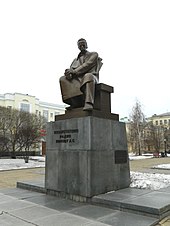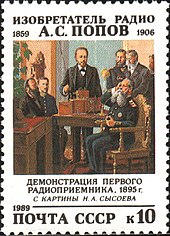Alexander Stepanovich Popov
Alexander Stepanovich Popov ( Russian Александр Степанович Попов ., Scientific transliteration Aleksandr Popov Stepanovič ; born March 4 . Jul / 16th March 1859 greg. In Turjinskije Rudniki , Perm province , † December 31, 1905 jul. / 13. January 1906 greg. in Saint Petersburg ) was a Russian physicist and pioneer of radio technology .

Life
As the son of a clergyman, Popov first studied at the Theological Seminary in Perm . In 1882 he graduated from the Faculty of Physics and Mathematics at St. Petersburg University . From the late 1880s, Popow began his research on electromagnetic waves. On May 7, 1895, at a meeting of the Russian Academy of Sciences , at that time in Saint Petersburg , he described his experiments on receiving electrical vibrations caused by natural lightning discharges during thunderstorms , and for the first time in the world demonstrated a detection device for this. He used a coherer that was already known at the time . From 1901 Popow headed the chair for physics at the St. Petersburg Electrotechnical Institute, in 1905 he became director of the institute.
In January 1896, Popov published an article in the Journal of the Russian Society of Physics and Chemistry under the title "Device for Detecting and Registering Electrical Vibrations" in which he provided the scheme and a detailed description of a radio receiver. A successful practical implementation of the device proved that it could actually intercept electromagnetic waves from the atmosphere, primarily lightning discharges during thunderstorms. On March 24, 1896, he demonstrated the wireless transmission of signals over a distance of 250 meters.
In June 1896, the Italian Guglielmo Marconi patented an invention in England that repeated the scheme of the receiving device previously published in Popov's publication. This action prompted the Russian scientist to make a number of statements in the Russian and international press, in which he defended his right of priority. In contrast to Marconi, Popow failed to patent his invention. He was honored for this at the Paris Electrotechnical Congress in 1900; In the public consciousness, Marconi is considered the inventor of radio telegraphy because of his early patent .
In the summer of 1897, Popow enlarged the transmission route. With funds from the Navy Ministry, new devices were manufactured and a communication range of five kilometers was achieved. The first Russian work on radio telegraphy, which initially had primarily a military significance, was carried out in secret. The property of the reflection of radio waves on objects, especially on metallic ships, discovered in the process, provided the basis for later radar technology .
In 1898 and 1899, Popow led the experiments on the Baltic Sea and the Black Sea and developed a method for converting the received radio waves into sound signals (before that they could only be recorded on paper). In 1900 the communication range was already 112 kilometers.
Alexander Popov was buried in the Volkovo Cemetery.
Representation in the Soviet Union
Long after Popov's death and after the Second World War , May 7th was declared “ Radio Day ” in 1945 in the Soviet Union . The choice of date followed the fact that on May 7, 1895, Popov first presented his attempts at receiving lightning discharges to the Russian Academy of Sciences, and May 7, 1945 was the 50th anniversary of this event. The East-West conflict that set in after 1945 contributed to the fact that the Russian physicist Popov is considered the inventor of the radio in the Soviet Union, also for propaganda reasons, and is venerated in this representation.
Web links
- Transcript of a broadcast on Alexander Popov 's Voice of Russia on March 24, 2009, accessed on December 4, 2016.
- Erica Vonderheid: Early Radio Transmission Recognized as Milestone. In: Broadcast Technology Society Newsletter. Volume 13, No. 4, Summer 2005, IEEE, ISSN 1067-490X, accessed December 4, 2016.
Individual evidence
- ^ A b G. RM Garratt: The Early History of Radio . 2nd Edition. Institution of Electrical Engineers (IEE), ISBN 978-0-85296-845-1 , Chapter 6: Popov, p. 71-74 .
- ↑ Guglielmo Marconi's British Patent No. 12.039, AD 1896: Improvements in Transmitting Electrical impulses and Signals, and in Apparatus therefor. Filing date June 2, 1896; Issued July 2, 1897. Accessed December 4, 2016.
- ↑ An immortal invention - On May 7th, the Soviet Union celebrates "Radio Day" - Russian scholar AS Popov built the first radio receiver. In: Österreichische Zeitung , newspaper of the Soviet Army for the population of Austria, May 7, 1947, p. 4 (online at ANNO ).
- ↑ A correction in the interests of science. In: Österreichische Zeitung , newspaper of the Soviet Army for the population of Austria, October 14, 1947, p. 4 (online at ANNO ).
| personal data | |
|---|---|
| SURNAME | Popov, Alexander Stepanowitsch |
| ALTERNATIVE NAMES | Попов, Александр Степанович (Russian spelling) |
| BRIEF DESCRIPTION | Russian physicist and radio technology pioneer |
| DATE OF BIRTH | March 16, 1859 |
| PLACE OF BIRTH | Turjinsky Rudniki |
| DATE OF DEATH | January 13, 1906 |
| Place of death | St. Petersburg |


